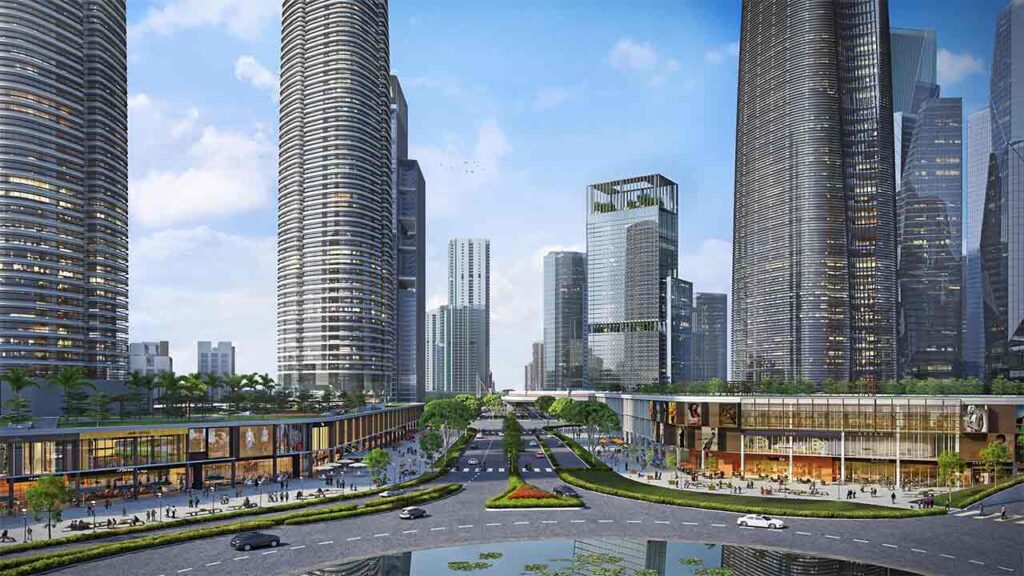The Port City of Colombo is the first Special Economic Zone designated for foreign currency transactions, primarily focusing on the export of services. Taking into consideration Sri Lanka’s economic landscape, which comprises around 60 per cent services; it’s crucial for Sri Lanka as an island nation to boost the export of services. Port city will provide the necessary drive to accomplish the goal of expanding export variety and the market reach. The real estate advancements in the Port City are mainly intended to establish a dynamic business hub in Colombo that appeals to the South Asian region.
With its sustainability initiatives concentrated on safeguarding and maintaining the environment, engaging its global community, and guaranteeing diversity and relevance across all of its sustainable activities, Port City Colombo uses an integrated approach to the management of energy, water, and waste.
Built on a philosophy that emphasizes holistic sustainable living and practices, Port City Colombo can effectively create a smart city that reduces the effects of urban heat islands and becomes resource efficient with a low demand for energy by addressing major global sustainability concerns through its green infrastructure supported by renewable energy sources and system solutions.

The special purpose entity, Port City Colombo, is a wholly owned subsidiary of China Harbour Engineering Company, the port city’s promoter investor. CHEC Port City Colombo has so far invested $1.5 billion for land reclamation, and all internal utility and infrastructure work is being completed. However, CHEC does not hold any ownership of the land but in order to recoup the $1.5 billion investment, rights to some areas have been granted. Nevertheless, the Port City Economic Commission is always the lessor when investors are identified.
The 269 hectares was vested with the Urban Development Authority when the reclamation was completed. The land was subsequently given to the Commission in 2021 on behalf of the Government according to the Port City Colombo Economic Commission Act. The Government of Sri Lanka thus owns the 269 hectares of land.
The commission gives up the leasehold rights when a prospective investor is found, and the Colombo Port City Economic Commission will be the lessor in any leasehold agreements in the port city on behalf of the Government. Therefore, the Government of Sri Lanka or the Commission acting on its behalf is always the landlord and lessor within the Port City.
As of right now, the project faces the challenge of luring investors to those 74 marketable land plots despite the completion of all infrastructure and land reclamation. Designated as a Special Economic Zone dedicated to the export of services, independent studies have identified IT, financial services, maritime & logistics, hospitality and tourism and professional services as the sectors with the highest potential to operate out of Port City Colombo.

Port City Colombo intends to entice both domestic and foreign investors to set up activities inside its borders by providing a favourable environment for doing business and commerce. Offering numerous incentives, including tax breaks, reduced regulations, and infrastructure support, will help with this.
Port City wants to draw companies from different industries by building modern, well-equipped commercial premises, nurturing a thriving business ecosystem. The export-focused services industry is then anticipated to increase as a result.
In the next five years PCC has identified 23 land lots which is about 65 hectares to be developed. The potential investment needed to develop this, is about $5.6 billion of which the economic impact of it would be quite significant. When the five-year plan rolls out, it will create close to 120,000 direct jobs. More importantly, once PCC is operational, the balance of payment impact is expected to be close to $1.6 billion making the net inflow of foreign currency close to $1.8 billion. Once the port city is completed the balance of payment impact will be close to $6 billion. Hence, the port city would really have a significant impact on the economic recovery of Sri Lanka.
Additionally, given the favourable geographical setting in Colombo, the Port City has the potential to serve as a hub for regional business operations, notably in South Asia. The Port City strives to attract global organisations, local businesses, and service providers who are eager to expand their operations, tap into the expanding South Asian market by providing cutting-edge infrastructure, connectivity, and amenities.
Eventually, by fostering a supportive business climate within its designated Special Economic Zone, the Port City aims to impact significant economic sectors, particularly the export of services. The Port City seeks to draw investments, encourage corporate growth, and contribute to the diversification and extension of Sri Lanka’s export portfolio through a combination of incentives, infrastructure development, and strategic positioning.








